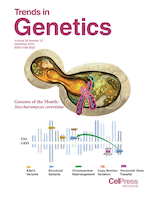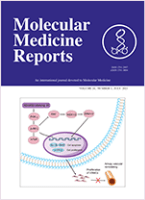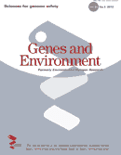
Clinical Epigenetics
metrics 2024
Pioneering Research at the Intersection of Genetics and Medicine
Introduction
Clinical Epigenetics is a pioneering open-access journal published by BMC, dedicated to advancing the field of epigenetics and its critical implications in clinical and translational research. Established in 2011, the journal has become an authoritative resource in the realms of developmental biology, genetics, and molecular biology, as evidenced by its impressive 2023 Scopus categorization as a Q1 journal in multiple domains including clinical genetics. With a robust impact factor and rankings that place it among the top quartiles in its fields—Rank #13 in Clinical Genetics and #14 in Developmental Biology—Clinical Epigenetics serves as an essential platform for researchers, professionals, and students alike, encouraging the dissemination of high-quality research findings. Operating from its United Kingdom headquarters, this journal not only contributes to scholarly dialogue across the globe but also supports unrestricted access to vital findings that push the boundaries of our understanding of epigenetic mechanisms and their clinical applications.
Metrics 2024
 1.73
1.73 4.80
4.80 5.80
5.80 79
79Metrics History
Rank 2024
Scopus
IF (Web Of Science)
JCI (Web Of Science)
Quartile History
Similar Journals

Epigenomes is a distinguished open access journal published by MDPI, dedicated to advancing the field of epigenetics and its interdisciplinary connections to biochemistry, genetics, and molecular biology. Since its inception in 2017, this journal has provided a transparent platform for researchers to share their findings, contributing to a deeper understanding of epigenetic mechanisms and their implications in health, toxicology, and mutagenesis. Ranked in the Q2 quartile across multiple categories, including biochemistry and genetics, Epigenomes is recognized for its scholarly contributions, reflected in its notable Scopus rankings. Readers benefit from a wealth of open access articles, fostering innovation and collaboration within the academic community. With its headquarters in Switzerland and an unwavering commitment to scientific rigor, Epigenomes is positioned as a vital resource for researchers, professionals, and students seeking to deepen their insights into the epigenomic landscape.

TRENDS IN GENETICS
Advancing the Frontiers of Genetic ResearchTRENDS IN GENETICS, published by CELL PRESS, is a leading journal in the field of genetics, recognized for its significant impact on research and advancements in the discipline. With an impressive Scopus ranking of #10 out of 347 in the category of Genetics and a 97th percentile ranking, this journal stands as a premier platform for publishing innovative, high-quality articles that shape the future of genetic research. Since its inception in 1985, TRENDS IN GENETICS has been at the forefront of the genetic sciences, continuously disseminating crucial findings while maintaining a strong commitment to scientific rigor and integrity. Although it does not currently offer open access options, its rigorous peer-review process ensures that only the most relevant and groundbreaking studies make it to publication. Scholars and practitioners in genetics will find this journal to be an invaluable resource for keeping abreast of the latest developments, trends, and methodologies that drive the field forward.

RNA
Catalyzing Breakthroughs in Molecular BiologyRNA is a premier journal in the field of molecular biology, published by COLD SPRING HARBOR LAB PRESS, PUBLICATIONS DEPT. With an impressive impact factor reflected by its Q1 status in the Molecular Biology category, this journal has established itself as an essential resource for researchers and professionals dedicated to understanding the role of RNA in biological processes. Spanning over two decades of impactful research from 1995 to 2024, RNA covers a broad spectrum of topics, including RNA biology, gene regulation, and therapeutic innovations. Researchers can access its extensive array of original research articles, reviews, and commentary, making it a vital conduit for new discoveries and methodologies in the field. With its high ranking within Scopus at Rank #115/410 and a 72nd percentile ranking in the domain of Biochemistry, Genetics, and Molecular Biology, RNA continues to advance the understanding of RNA and its critical contributions to life sciences.

CANCER SCIENCE
Pioneering discoveries in cancer biochemistry and genetics.Cancer Science, an esteemed journal published by Wiley, stands at the forefront of oncology research, boasting an impressive impact factor and a classification in the Q1 category for its contributions in Cancer Research, Medicine, and Oncology as of 2023. Since its inception in 2003 and transitioning to an Open Access model in 2014, the journal has facilitated global dissemination of critical research findings, ensuring that vital information remains accessible to researchers, clinicians, and students alike. With its comprehensive scope covering cutting-edge discoveries in cancer biochemistry, genetics, and molecular biology, Cancer Science is recognized for its rigorous peer-review process and significant contributions to advancing our understanding of cancer. The journal, located at 111 River St, Hoboken, NJ, is an essential resource for anyone dedicated to improving treatment outcomes and pushing the boundaries of cancer research.

Molecular Medicine Reports
Elevating Knowledge in Molecular MedicineMolecular Medicine Reports, an esteemed academic journal published by Spandidos Publications Ltd, serves as a vital platform for the dissemination of cutting-edge research in the field of molecular medicine. Established in 2008, this journal has rapidly ascended in prominence, currently positioned within the Q2 and Q3 quartiles across various critical categories including Biochemistry, Cancer Research, and Genetics, reflecting its significant impact and scholarly contributions. With an impressive Scopus ranking in multiple disciplines, including an 87th place in Oncology, it is recognized for publishing rigorous, peer-reviewed articles that bridge the gap between laboratory research and clinical applications. The journal’s commitment to advancing knowledge in molecular medicine is evident through its focus on innovative therapeutic approaches, genetic research, and oncological studies, catering to a diverse readership of researchers, professionals, and students in the biomedical field. Though not an open-access publication, it provides invaluable insights and fosters collaboration in the scientific community from its base in Athens, Greece.

GENE
Illuminating the Path of Genetic AdvancementsGENE, an esteemed journal published by Elsevier, serves as a vital resource for researchers and professionals in the fields of genetics and medicine. With an ISSN of 0378-1119 and an E-ISSN of 1879-0038, this scholarly journal has been at the forefront of genetic research since its inception in 1976 and is set to continue until 2025. Situated in the Netherlands, GENE is recognized for its significant contributions, reflected in its Q2 ranking in both Genetics and Miscellaneous Medicine categories for 2023. This positioning within the Scopus rankings demonstrates its impact and relevance in a competitive field, where it holds the rank of #129 out of 347 in Genetics, placing it within the 62nd percentile. Although it does not offer open access options, GENE provides invaluable insight into contemporary genetic research, thereby fostering academic discussions and advancements. Researchers, professionals, and students alike will find GENE an essential platform for disseminating knowledge and exploring innovative developments in genetics and associated sciences.

JOURNAL OF MOLECULAR MEDICINE-JMM
Championing High-Quality Research in Biomedical Science.JOURNAL OF MOLECULAR MEDICINE (JMM) is a premier publication dedicated to advancing the field of molecular medicine, encompassing critical areas such as drug discovery, genetics, and biochemistry. Published by Springer Heidelberg in Germany, this influential journal has established its significance within the academic community, achieving an impressive Q1 ranking across multiple categories as of 2023, including Drug Discovery, Clinical Genetics, and Molecular Medicine. With a focus on publishing high-quality research and novel insights, JMM appeals to a diverse audience of researchers, professionals, and students passionate about the molecular underpinnings of health and disease. The journal, which has seen a convergence of relevant research spanning from 1976 to 2024, is instrumental in showcasing groundbreaking studies that push the boundaries of knowledge in molecular therapeutics and biomedical science. While it does not offer open access, the rigor of its peer-reviewed content ensures that each publication is a valuable addition to the scientific discourse surrounding molecular medicine. For comprehensive studies and reviews that highlight the intersection of molecular biology and clinical application, look no further than JOURNAL OF MOLECULAR MEDICINE.

Genes and Environment
Navigating the Complexities of Genes and EnvironmentGenes and Environment is a premier interdisciplinary journal published by BMC that explores the dynamic interplay between genetic factors and environmental influences shaping health and behavior. Since its inception, the journal has gained recognition for its commitment to providing open access (since 2015) to groundbreaking research, fostering an inclusive platform for scholars worldwide. With an ISSN of 1880-7046 and an E-ISSN of 1880-7062, Genes and Environment consistently ranks in Q2 in Environmental Science, Q3 in Genetics, and Q2 in Social Psychology according to the 2023 category quartiles, highlighting its significant contributions to these fields. The journal is headquartered in the United Kingdom and has a diverse portfolio of research spanning from 2006 to 2024. It is recognized in Scopus with commendable rankings across various disciplines. By fostering dialogue among researchers, professionals, and students, Genes and Environment serves as a vital resource for understanding complex biological interactions with environmental factors, ultimately aiming to advance knowledge and inform public policy.

CHROMOSOMA
Advancing the Frontiers of Chromosomal BiologyCHROMOSOMA is a prestigious journal dedicated to advancing the field of genetics, published by Springer in Germany. With an ISSN of 0009-5915 and an E-ISSN of 1432-0886, this journal has been a cornerstone in the publishing landscape since its inception in 1939, serving as a critical resource for researchers and professionals interested in the intricacies of chromosomal biology. Although it operates on a subscription basis, the journal's rigorous peer-review process ensures the dissemination of high-quality research findings. With a commendable Q2 ranking in both genetic and clinical genetics categories as of 2023, CHROMOSOMA aims to bridge theoretical concepts with practical applications in medicine and biology. Researchers will appreciate its relevance, as indicated by its Scopus ranks and integration of diverse topics ranging from molecular genetics to clinical implications. By fostering collaboration and knowledge-sharing among scholars, CHROMOSOMA continues to shape the future of genetic research.

BIOCHEMICAL GENETICS
Pioneering Research in Genetics and Molecular BiologyBIOCHEMICAL GENETICS, published by Springer/Plenum Publishers, is a prominent journal in the fields of biochemistry, genetics, and molecular biology, with a substantial impact on the scientific community since its inception in 1967. The journal holds a significant position within various academic quartiles, ranking Q2 in Ecology, Evolution, Behavior and Systematics, and Q3 in Biochemistry, Genetics, and Medicine (miscellaneous), among others, demonstrating its diverse and interdisciplinary reach. With an ISSN of 0006-2928 and an E-ISSN of 1573-4927, it is recognized for contributing critical research insights and methodologies that drive the fields of biochemical genetics forward. Although it is not an Open Access journal, it provides vital access options and resources for researchers globally, facilitating the dissemination of knowledge across institutions. Positioned within the competitive landscape of Scopus rankings, it maintains respectable standings across its focused areas, making it an invaluable resource for researchers, professionals, and students seeking to deepen their understanding of genetic mechanisms and biochemical processes.